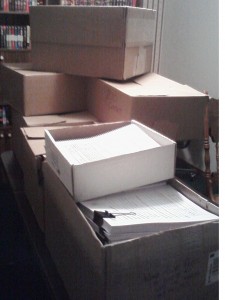The undeniable truth is that writers are ultimately responsible for marketing their books themselves. Nobody questions this state of affairs in the realm of self-publishing, of course, where the author is responsible for every aspect of his or her book. But even writers with big contracts from major publishers will tell you that a great deal (okay, the lion’s share) of the publicity work ends up landing on their plate.Having recently secured a publishing deal with a small press in Canada (where I’m from), I now find myself in the position of having to execute a marketing plan for my own book. Marketing is not my strength. In fact, as a purely creative type who wants to spend all his time living in his own make-believe worlds (I know, I sound like a fun person to spend a Saturday night with, right?), taking on the burden of building a fanbase is an unsavory business I would much rather avoid-or at least leave to the professionals.
Fortunately, I have a writing partner on the project so I don’t have to go it alone.
First, we set to the task of brainstorming some ways to get the word out about our coming book. Before too long, an obvious target for our efforts emerged: social media.
On my own, I would hardly consider myself a social media guru. I check Facebook almost every day, but I post updates infrequently (no more than a couple of times per month). I don’t have a Twitter account, and don’t even get me started on this Google+ nonsense. Frankly, it seems entirely too time-consuming, as though I could spend all my time promoting myself and never find the time to actually write. I guess some people are wired for it more than others.
Like my writing partner, for example. Thank heavens for small miracles.
Just over two weeks ago, we started our campaign by opening a Facebook account for one of the main characters in the novel. Just as it’s important to keep a blog active in order to see eventual success, we knew this would only have a shot at working if the account stayed active and busy, and built up a significant number of followers very quickly.
We met our initial goal (we have north of 500 Facebook friends now), so we expanded our effort by cross-posting all our updates to Twitter. We aim for three or four new updates or links everyday, to make sure we don’t disappear from people’s home pages. The effort does seem to be succeeding, as the activity on the page is significantly greater than any buzz I’ve ever managed to build or maintain on my own behalf.
The next step, which just kicked in earlier this week, was the formation of a blog for the same fictional character. We’re just beginning to get hits on it, and several people have already subscribed. At first, I’ve written blog posts that function as a teaser trailer of sorts for the book itself, introducing one of the novel’s central mysteries. As time goes on, we plan to tackle subjects and research that hint at possible sequels.
I have no idea whether these efforts will be successful in the long-run, but so far they seem to be exceeding our modest expectations. I have reason to be optimistic.
These are, of course, just a handful of ideas. There must be lots of others. What sorts of marketing efforts have other people tried? By all means, chime in and maybe we can do some brainstorming.

